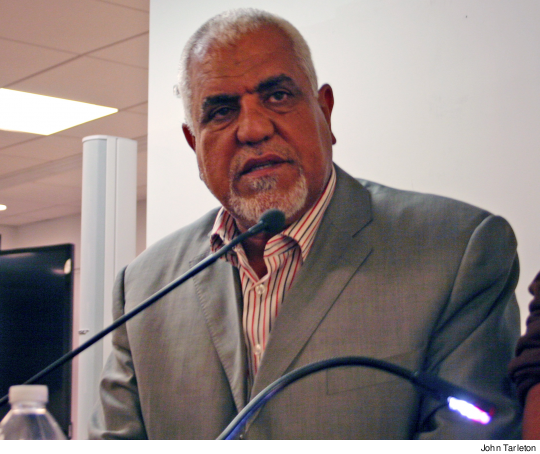On November 10, all charges were dismissed against Hassan Juma’a Awad, president of the Iraq Federation of Oil Unions (IFOU). The charges, filed by the South Oil Company and the Ministry of Oil, were dismissed at a court hearing in Basra, in southern Iraq.
 |
Hassan Juma’a was charged under section 111 of the Iraqi penal code of 1969, legislation that Saddam Hussein had used to repress organizing among government employees. The charges said that Juma’a had undermined the Iraqi economy by instigating strikes and work stoppages by oil workers – actions the workers took to protest unresolved grievances, safety violations, privatization of Iraq’s oil industry and refusal to respect worker and union rights.
Harsh Penalties
If convicted of harming “the interests of the state,” Hassan Juma’a would have faced up to three years in prison and tens of thousands of dollars in fines.
The November dismissal was the second time that criminal charges against Hassan Juma’a had been thrown out by the court. After the same accusations were dismissed on July 1, the Ministry of Oil and the South Oil Company appealed the decision. The appellate court reinstated the charges and sent the case back to the lower court for another hearing.
Hassan Juma’a insisted throughout that his activities and statements were part of the normal and legitimate work of his union; he noted that the IFOU had even received thank-you letters from the Ministry of Oil for its contributions to the industry.
Corporate Exploitation
The workers’ actions that sparked the charges against Hassan Juma’a happened in February.
“Hundreds of workers demonstrated on three separate occasions outside the building of the government-run South Oil Company in Basra, calling for its director and his aides to resign,” reported David Bacon in In These Times. “The company, managed by the national oil ministry, [had] promised to build housing for workers, an urgent necessity in a province still recovering from war. Workers said they hadn’t been paid their normal bonuses for two years….They also demanded better medical care, especially for those suffering the effects of exposure to depleted uranium. This heavy metal was used extensively in shells and other munitions by US forces, and war remnants are still piled high in neighborhoods and across the countryside,” Bacon wrote.
After the November 10 ruling, Hassan Juma’a issued a statement thanking US Labor Against the War (USLAW), the AFL-CIO’s Solidarity Center, and other unions and labor federations around the world for their support and solidarity.
“The US Occupation Authority, then Interim Governing Authority, and now the elected government of Iraq resurrected a law and decrees put in place by Saddam Hussein to prevent public workers and employees of public enterprises – 80% of the Iraqi economy – from forming or joining a union or negotiating over the terms and conditions of their labor,” said USLAW National Coordinator Michael Eisenscher when the charges were first dismissed in July. “They shamefully kept that law on the books and have actively enforced it against workers, all while preaching about the importance of establishing a democracy in Iraq.”
Hassan Juma’a had spoken about the case against him when he visited the PSC Union Hall on September 23, for a forum organized by USLAW. He stopped in New York City on the way home to Iraq, after taking part in this year’s AFL-CIO convention in Los Angeles. “There’s a background to this case that you all should know,” he told the forum. “The Iraqi oil workers union has a clear position on the issue of oil in Iraq…. We opposed the licensing of foreign corporations’ extraction of oil and production of oil in Iraq. We don’t think anyone with half a brain would give such licenses to these corporations and think that they are reasonable. It’s completely absurd to give out 20-year contracts – this is called throwing away the resources of future generations. So the government took the position that the union was trying to hinder economic activity and was making trouble.”
Victory
After the charges were first dismissed, said Hassan Juma’a, “Politics intervened and the government demanded an appeal…. It’s as if there’s going to be a lot of arm twisting to make sure that Iraqi unionists remain afraid.”
“The government sought to make an example of [Hassan Juma’a] as a warning to other workers who dare to exercise their rights,” commented Eisenscher. “It failed. “
“Our victory sets an important precedent,” said Ismaeel Dawood of the Iraq Civil Society Solidarity Initiative. “International solidarity and messages addressed to the ministry and the prime minister had a significant impact on the verdict. “
International Solidarity
Although Hassan Juma’a was the only oil union leader to be criminally prosecuted, he has not been the only target of government and oil company repression. Administrative fines by the Ministry of Oil totaling more the $600,000 have been levied against 16 other union activists, including IFOU Vice President Ibrahim Rhadi, in retaliation for their role in organizing worker protests. Rhadi alone faces fines in excess of $30,000, which if unpaid will result in the loss of his job, confiscation of his property and imprisonment.
“The need for continuing international solidarity is essential to end this escalating reign of harassment, retaliation and repression,” said a November statement from USLAW. (For information about what you can do, go to uslaboragainstwar.org.)

